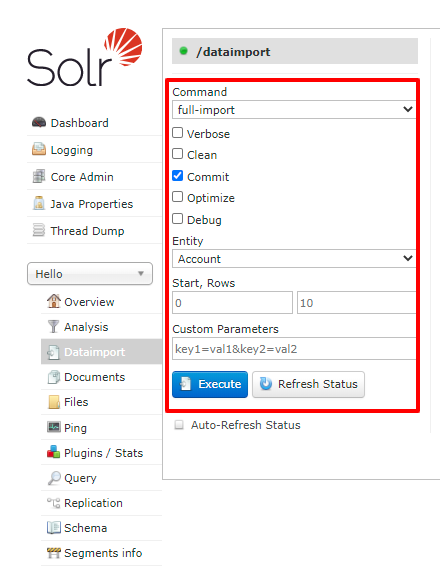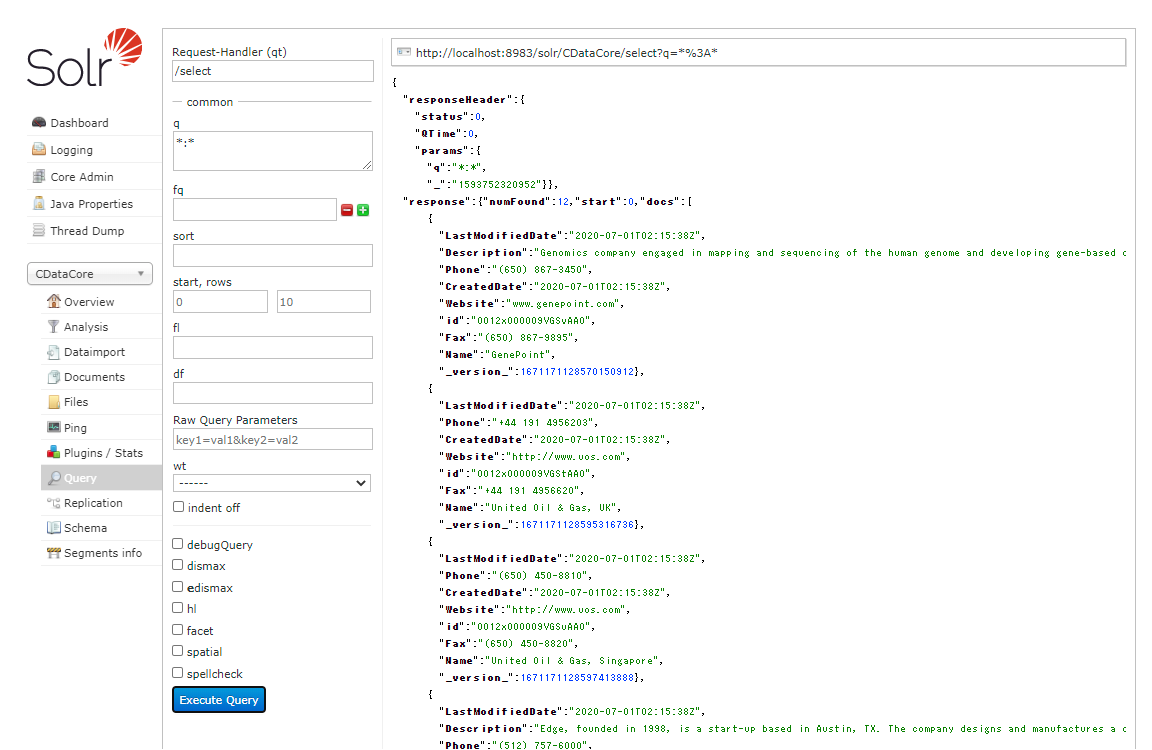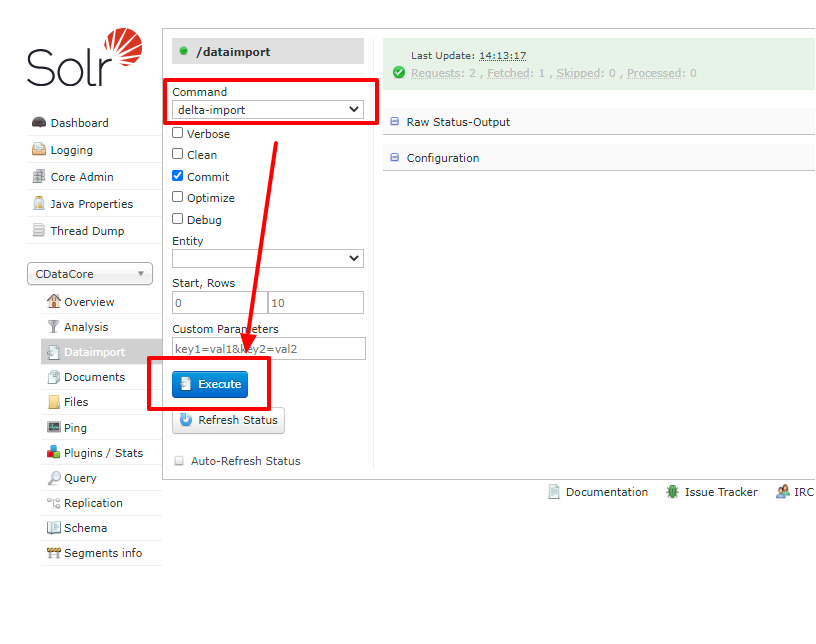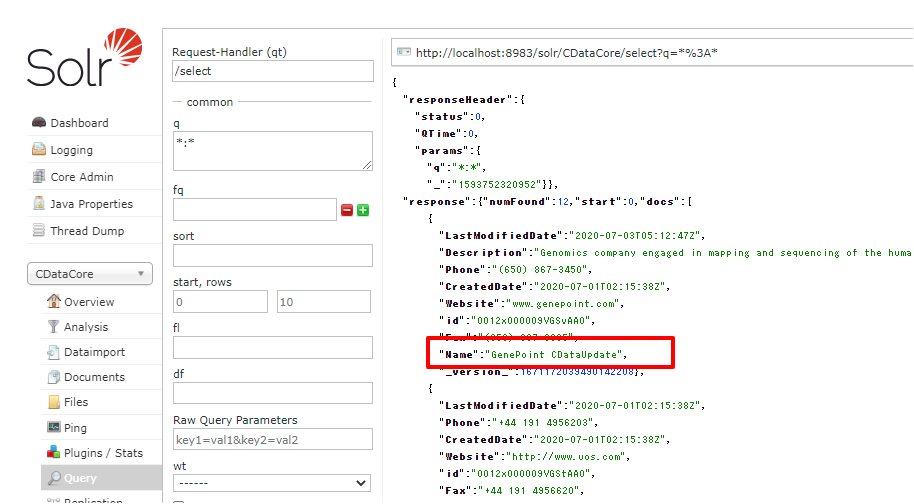Model Context Protocol (MCP) finally gives AI models a way to access the business data needed to make them really useful at work. CData MCP Servers have the depth and performance to make sure AI has access to all of the answers.
Try them now for free →How to import Odoo Data into Apache Solr
Use the CData JDBC Driver for Odoo in Data Import Handler and create an automated import of Odoo data to Apache Solr Enterprise Search platform.
The Apache Solr platform is a popular, blazing-fast, open source enterprise search solution built on Apache Lucene.
Apache Solr is equipped with the Data Import Handler (DIH), which can import data from databases and, XML, CSV, and JSON files. When paired with the CData JDBC Driver for Odoo, you can easily import Odoo data to Apache Solr. In this article, we show step-by-step how to use CData JDBC Driver in Apache Solr Data Import Handler and import Odoo data for use in enterprise search.
About Odoo Data Integration
Accessing and integrating live data from Odoo has never been easier with CData. Customers rely on CData connectivity to:
- Access live data from both Odoo API 8.0+ and Odoo.sh Cloud ERP.
-
Extend the native Odoo features with intelligent handling of many-to-one, one-to-many, and many-to-many data properties. CData's connectivity solutions also intelligently handle complex data properties within Odoo. In addition to columns with simple values like text and dates, there are also columns that contain multiple values on each row. The driver decodes these kinds of values differently, depending upon the type of column the value comes from:
- Many-to-one columns are references to a single row within another model. Within CData solutions, many-to-one columns are represented as integers, whose value is the ID to which they refer in the other model.
- Many-to-many columns are references to many rows within another model. Within CData solutions, many-to-many columns are represented as text containing a comma-separated list of integers. Each value in that list is the ID of a row that is being referenced.
- One-to-many columns are references to many rows within another model - they are similar to many-to-many columns (comma-separated lists of integers), except that each row in the referenced model must belong to only one in the main model.
- Use SQL stored procedures to call server-side RFCs within Odoo.
Users frequently integrate Odoo with analytics tools such as Power BI and Qlik Sense, and leverage our tools to replicate Odoo data to databases or data warehouses.
Getting Started
Create an Apache Solr Core and a Schema for Importing Odoo
- Run Apache Solr and create a Core.
> solr create -c CDataCoreFor this article, Solr is running as a standalone instance in the local environment and you can access the core at this URL: http://localhost:8983/solr/#/CDataCore/core-overview - Create a schema consisting of "field" objects to represent the columns of the Odoo data to be imported and a unique key for the entity. LastModifiedDate, if it exists in Odoo, is used for incremental updates. If it does not exist, you cannot do the deltaquery in the later section. Save the schema in the managed-schema file created by Apache Solr.
- Install the CData Odoo JDBC Driver. Copy the JAR and license file (cdata.odoo.jar and cdata.jdbc.odoo.lic) to the Solr directory.
- CData JDBC JAR file: C:\Program Files\CData\CData JDBC Driver for Odoo ####\lib
- Apache Solr: solr-8.5.2\server\lib
OdooUniqueKey
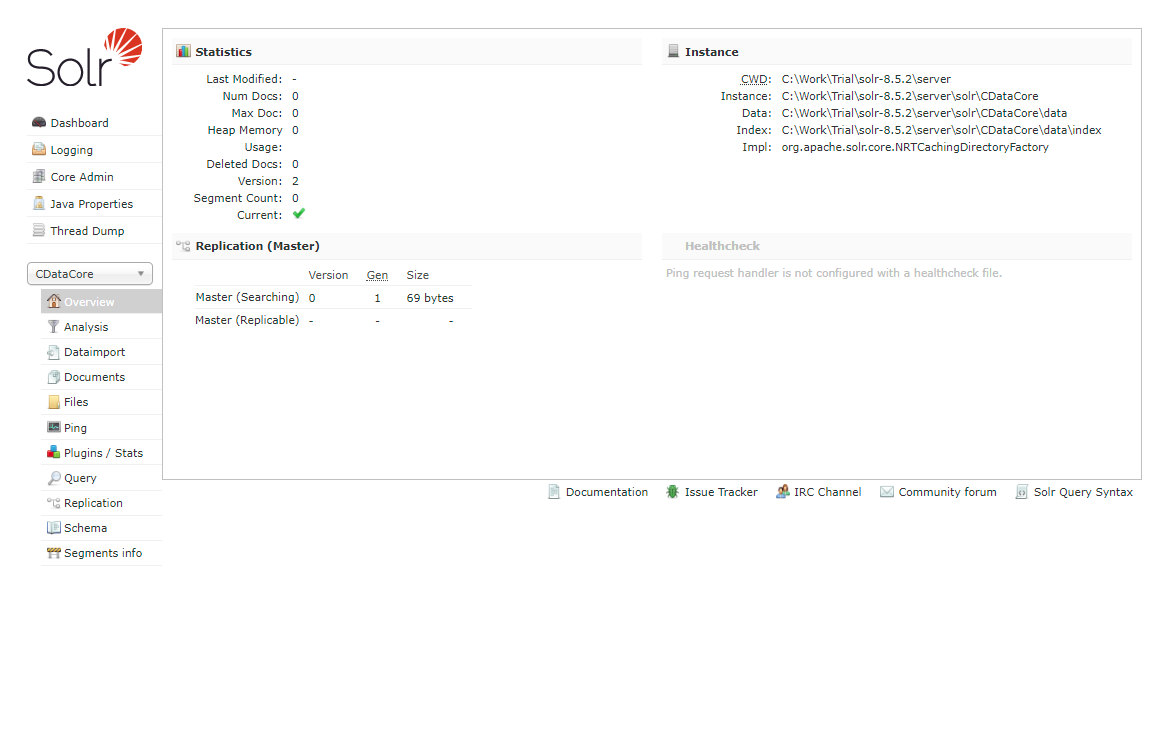
Now we are ready to use Odoo data in Solr.
Define an Import of Odoo to Apache Solr
In this section, we walk through configuring the Data Import Handler.
- Modify the Config file of the created Core. Add the JAR file reference and add the DIH RequestHander definition.
<lib dir="${solr.install.dir:../../../..}/dist/" regex="solr-dataimporthandler-.*\.jar" /> <requestHandler name="/dataimport" class="org.apache.solr.handler.dataimport.DataImportHandler"> <lst name="defaults"> <str name="config">solr-data-config.xml</str> </lst> </requestHandler> - Next, create a solr-data-config.xml at the same level. In this article, we retrieve a table from Odoo, but you can use a custom SQL query to request data as well. The Driver Class and a sample JDBC Connection string are in the sample code below.
<dataConfig> <dataSource driver="cdata.jdbc.odoo.OdooDriver" url="jdbc:odoo:User=MyUser;Password=MyPassword;URL=http://MyOdooSite/;Database=MyDatabase;"> </dataSource> <document> <entity name="res_users" query="SELECT Id,OdooColumn1,OdooColumn2,OdooColumn3,OdooColumn4,OdooColumn5,OdooColumn6,OdooColumn7,LastModifiedDate FROM res_users" deltaQuery="SELECT Id FROM res_users where LastModifiedDate >= '${dataimporter.last_index_time}'" deltaImportQuery="SELECT Id,OdooColumn1,OdooColumn2,OdooColumn3,OdooColumn4,OdooColumn5,OdooColumn6,OdooColumn7,LastModifiedDate FROM res_users where Id=${dataimporter.delta.Id}"> <field column="Id" name="Id" ></field> <field column="OdooColumn1" name="OdooColumn1" ></field> <field column="OdooColumn2" name="OdooColumn2" ></field> <field column="OdooColumn3" name="OdooColumn3" ></field> <field column="OdooColumn4" name="OdooColumn4" ></field> <field column="OdooColumn5" name="OdooColumn5" ></field> <field column="OdooColumn6" name="OdooColumn6" ></field> <field column="OdooColumn7" name="OdooColumn7" ></field> <field column="LastModifiedDate" name="LastModifiedDate" ></field> </entity> </document> </dataConfig> - In the query section, set the SQL query that select the data from Odoo. deltaQuery and deltaImportquery define the ID and the conditions when using incremental updates from the second import of the same entity.
- After all settings are done, restart Solr.
> solr stop -all > solr start
Run a DataImport of Odoo Data.
- Execute DataImport from the URL below:
http://localhost:8983/solr/#/CDataCore/dataimport//dataimport![Load Odoo data to Solr using Data Import.]()
- Select the "full-import" Command, choose the table from Entity, and click "Execute."
![Execute full import in Solr.]()
- Check the result of the import from the Query.
![Check the full import result of Odoo.]()
- Try an incremental update using deltaQuery. Modify some data in the original Odoo data set. Select the "delta-import" command this time from DataImport window and click "Execute."
![Execute Delta import in Solr.]()
- Check the result of the incremental update.
![Check the delta import result of Odoo.]()
Using the CData JDBC Driver for Odoo you are able to create an automated import of Odoo data into Apache Solr. Download a free, 30 day trial of any of the 200+ CData JDBC Drivers and get started today.

